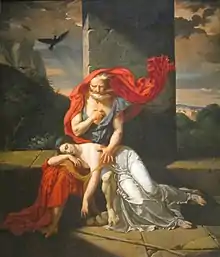Трагический герой
Трагический герой — основной протагонист произведений жанра трагедия. Данный тип героя был разработан древнегреческими трагиками — Софоклом, Эсхилом, Еврипидом, затем получил развитие в трагедиях Сенеки, Уильяма Шекспира, Гёте, Шиллера и других.

Фульшран Жан Аррье. Эдип в Колоне
По словам Аристотеля, трагический герой должен вызывать у зрителя чувство жалости и страха[1]. В то же время он отмечает, что трагический герой должен быть добродетельным, но никогда в высшей мере[2].
Примечания
- S.H. Butcher, The Poetics of Aristotle, (1902), pp. 45-47
- Charles H. Reeves, The Aristotelian Concept of The Tragic Hero, Vol. 73, No. 2 (1952), Published by: The Johns Hopkins University Press Stable URL: https://www.jstor.org/stable/291812 pp. 172—188
Литература
- Carlson, Marvin. 1993. Theories of the Theatre: A Historical and Critical Survey from the Greeks to the Present. Expanded ed. Ithaca and London: Cornell University Press. ISBN 0801481546.
- Janko, Richard, trans. 1987. Poetics with Tractatus Coislinianus, Reconstruction of Poetics II and the Fragments of the On Poets. By Aristotle. Cambridge: Hackett. ISBN 978-0872200333.
- Pavis, Patrice. 1998. Dictionary of the Theatre: Terms, Concepts, and Analysis. Trans. Christine Shantz. Toronto and Buffalo: University of Toronto Press. ISBN 978-0802081636.
This article is issued from Wikipedia. The text is licensed under Creative Commons - Attribution - Sharealike. Additional terms may apply for the media files.